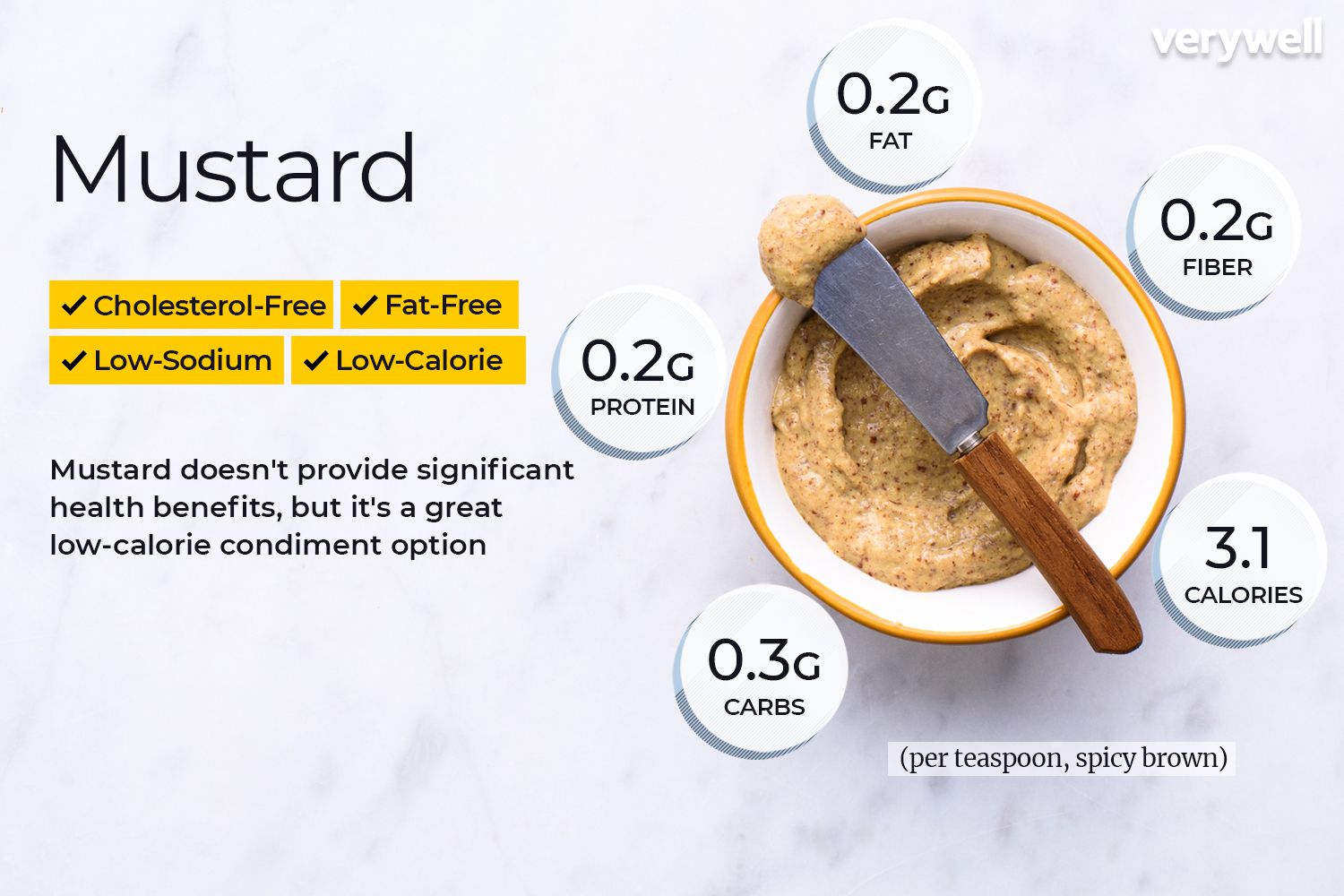The Health Benefits of Mustard
Mustard is a low-calorie alternative to higher-fat condiments.

Verywell / Alexandra Shytsman
Prepared yellow mustard is one of the most common condiments used in homes around the country. The familiar topping is usually made by combining mustard seeds (Brassica alba) with vinegar, salt, lemon, and other ingredients.
There are also other varieties of mustard made from other types of mustard seed including brown mustard seeds (Brassica juncea) or black mustard seeds (Brassica nigra).
Is Mustard Good For You?
Mustard is good for you because it contains several antioxidants that provide various health benefits including anti-cancer, antibacterial, antiviral, antifungal, anti-inflammatory, and wound-healing properties. Mustard is a low-calorie highly flavored condiment that can replace or augment more calorie dense options.
Health Benefits
Mustard is usually consumed in small amounts. When consumed as a condiment, it is not associated with significant health benefits. However, mustard is a low-calorie alternative to many higher-fat condiments like mayonnaise.
Different types of mustard seeds are used for health purposes. For example, old herbalists used the white mustard seed to clear the voice when mixed with honey.
Mustard contains two antioxidants of interest: isothiocyanates and sinigrin. Isothiocyanates, the oil responsible for giving the pungent taste found in mustard, has anti-cancer capabilities for breast, lung, GI tract, and prostate cancers. However, the mechanism remains unclear and more research is needed to conclude the efficacy of mustard's health benefits related to cancer.
Isothiocyanates may also play a role in diabetes management, reduce bad cholesterol to provide cardiovascular protective effects and neurological benefits that may help people with autism. But, similar to the cancer benefits, more research is needed.
The other antioxidant mustard contains is sinigrin, which is a precursor for isothiocyanates until it is damaged or smashed. When this happens an enzyme turns it into isothiocyanates or mustard oil. Research shows this antioxidant has anti-cancer, antibacterial, antiviral, antifungal, anti-inflammatory, and wound-healing properties.
However, there is currently not enough scientific evidence to support any of these cosmetic or medicinal uses of mustard or mustard seed.
Nutrition Facts
A single serving of mustard is usually about a teaspoon. A packet of mustard that you find in restaurants is often about a one-teaspoon serving. It is not likely that you will consume a lot of mustard because of the condiment's spicy, pungent, and salty flavor.
A serving of prepared yellow mustard provides only about 3 calories, according to USDA data. (One teaspoon of spicy mustard is also around 3 calories per serving.) Most of the calories in mustard come from carbohydrates, but because the calorie count is so low, these carbs are not likely to make a significant difference in your daily intake.
Dijon mustard may provide more calories, but not many more. A single serving of Dijon mustard may contain up to 10 calories.
There are no significant vitamins or minerals in a single serving of mustard.
Selection, Preparation, and Storage
Mustard is easy to find in almost every grocery store. You'll find prepared yellow mustard and Dijon mustard in the condiment aisle of most markets.
If you visit a specialty store, you can also find more exotic flavors. For example, you may see mustard made with honey, spicy peppers, and wine. You might also see course mustard varieties that have a distinct texture with seeds still intact.
It is smart to buy mustard in small quantities. The condiment can lose flavor with time. Since you probably will use mustard in limited amounts, you don't want to buy a large container that will likely spoil.
Once opened, store mustard in the refrigerator for up to one year.
Mustard imparts a strong, spicy taste that pairs well with meat and seafood. Mustard can also be used to make salad dressings.
Recipes With Mustard
Possible Side Effects
Mustard is "generally recognized as safe" (GRAS) by the United States Food and Drug Administration when consumed in amounts commonly found in food. However, if you use mustard for cosmetic or medicinal uses, you should exercise caution.
The Natural Medicines Database notes that applying white or black mustard to the skin for an extended period of time can cause burns, blisters, or ulcers. The source also notes that consuming large amounts of black mustard seed by mouth can damage the throat and cause side effects including heart failure, diarrhea, drowsiness, breathing difficulties, coma, and death.
Lastly, mustard and mustard seed allergies are not uncommon. According to the Anaphylaxis Campaign in the United Kingdom, other foods derived from the mustard plant—including mustard leaves, seeds and flowers, sprouted mustard seeds, mustard oil, and foods that contain these—are likely to cause reactions in people with a mustard allergy.
Symptoms of a mustard allergy may be mild or severe—they generally come on shortly after consuming the mustard product. You may experience a rash or a tingly, itchy feeling in the mouth. Difficulty breathing is also possible.
Frequently Asked Questions
- Can I freeze mustard?
Mustard does not freeze well. It's best to refrigerate opened mustard.
- What is a suitable mustard substitute in recipes?
Some cooks substitute mayonnaise or wasabi if they are preparing a recipe and don't have mustard on hand.
Mazumder A, Dwivedi A, Du Plessis J. Sinigrin and its therapeutic benefits. Molecules. 2016;21(4):416. doi:10.3390/molecules21040416
Ewing, Sarah. Black Mustard (Brassica Nigra) Ethnobotanical Leaflets.
Palliyaguru DL, Yuan J-M, Kensler TW, Fahey JW. Isothiocyanates: translating the power of plants to people. Mol Nutr Food Res. 2018;62(18):1700965. doi:10.1002/mnfr.201700965
White Mustard. Full Professional Monograph. Natural Medicines Comprehensive Database. 2/13/2018.
Black Mustard. Full Professional Monograph. Natural Medicines Comprehensive Database. 5/31/2018.
USDA Food Composition Databases. Basic Report: 02046, Mustard, prepared, yellow.
:max_bytes(150000):strip_icc()/Malia-Frey_1000-2f7768d8777a4ebbac39d628bc31b714.jpg)
:max_bytes(150000):strip_icc()/Jonathan-Valdez-1000-6bc14f19258d473786a3208826574c75.jpg)
:max_bytes(150000):strip_icc()/Malia-Frey_1000-2f7768d8777a4ebbac39d628bc31b714.jpg)
:max_bytes(150000):strip_icc()/GettyImages-157525987-58e694be5f9b58ef7edd5c2b.jpg)
:max_bytes(150000):strip_icc()/mustard-greens-crop-7d76a72490ba4fc890d3171e2d1c0555.jpg)
:max_bytes(150000):strip_icc()/mustard-oil-crop-bbd73833f8ee41bea8262013b44409d2.jpg)
:max_bytes(150000):strip_icc()/GettyImages-769772423-f3f00d53702e4d1ba00d0c9e19baaec9.jpg)
:max_bytes(150000):strip_icc()/mustard-crop-996376c4660d47c0b229bf7955a7152b.jpg)
:max_bytes(150000):strip_icc()/horseradish-crop-fe5665418a5d480384ea3e3f99621c8c.jpg)
:max_bytes(150000):strip_icc()/watermelon-crop-bf0b166bf23f44629bd4e75efc65a455.jpg)
:max_bytes(150000):strip_icc()/wasabi-crop-1-79ea18af9749497083229e2f8b3aee77.jpg)
:max_bytes(150000):strip_icc()/GettyImages-78384685-5b1e95bafa6bcc0036ba4180.jpg)
:max_bytes(150000):strip_icc()/sriracha-crop-70ad74b661ec4445907f6d04f109298c.jpg)
:max_bytes(150000):strip_icc()/aioili-crop-1597071d026a4df0a8edd34d717ea415.jpg)
:max_bytes(150000):strip_icc()/tartar-sauce-54bacd0fa5d84407a3370b2f9f7dd58e.jpg)
:max_bytes(150000):strip_icc()/turkey-sandwich-09f5e7ad540f4f28994e80bdd9af05db.jpg)
:max_bytes(150000):strip_icc()/french-dressing-crop-2-9b8aa569cee14f99b7d2e5adc51afbea.jpg)
:max_bytes(150000):strip_icc()/vinegars-crop-f6bb70f580204692823dd799262c8ecd.jpg)
:max_bytes(150000):strip_icc()/turmeric-crop-f1625af45a22466e89e38563d1cfd96d.jpg)